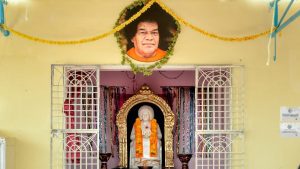
Everybody in this world has some desires that drive their actions. Some want to accumulate wealth, others seek fame and fame. Some love to travel, others crave wine and women. Economic growth, consumerism and media-generated hype make the allure of a lavish lifestyle exceed limits. In the end, we find ourselves frustrated and disillusioned. It is said that “enough is enough to satisfy our needs, but not enough to satisfy our desires”. But the line between need and desire is very thin.
Control of desires refers to the practice of restricting one’s desires and expenses to what is necessary and reasonable. It is based on the teachings of Sri Sathya Sai Baba who said that one should control excessive desires which lead to a restless and destructive life. He recommended curbing excessive conversation, excessive spending and avoiding waste of food, time and energy.
What is desire? Desire is the motivation for man to exist, live and flourish. The Sanskrit word for this is like This includes all kinds of desires, including sexual desire. Desires generally arise all the time, not only from within but also from external stimuli. Every human being has his own “purpose in life”. Therefore, a choice can be made. Depending on the “purpose in life”, people have four categories of desires. Those who believe that they should prosper at the expense of others (I win, you lose) have selfish desires. Those who sacrifice themselves for the collective good (you win, I lose) become heroes. Those who excel and at the same time do good deeds to others (I win, you win) become wise leaders. Finally, those who hurt others and hurt themselves (I lose, you lose) are fools.
Maslow’s “hierarchy of needs” theory identifies five types of needs: physiological needs (food, shelter, sex), safety needs (health, job security), love and belonging (relationships), ego or self-esteem (status, recognition), and self-actualization (reaching one’s full potential). According to Maslow, these needs function in a hierarchy. Higher needs cannot be satisfied unless lower needs are met. However, many great leaders achieved self-actualization by “avoiding” the earlier stages. For example, the great mathematician Ramanujan ignored hunger (physiological needs); Gandhi lost his job as a lawyer to return to India (security); and Adi Shankaracharya returned to India and was happy with his life there. Sanyasa (Monkhood), sacrificing family life (sense of belonging), Chanakya was humiliated by the Nanda kings (respect), yet they all attained the pinnacle of success (Self-realization). Thus, desires are subdued.
The four stages of life (ashrams) described in ancient times provided the means to channelize desires in an appropriate manner. Childhood (brahmacharya ashram) fulfilled the desire to play and pursue learning. Adulthood (grahastha ashram) fulfilled the desire to marry, court and raise a family for offspring. After discharging their worldly responsibilities, the old couple went to the forest (vanaprastha ashram) to pursue spiritual knowledge. Finally, the cycle of desires ended with renunciation (sanyas ashram). But Adi Shankaracharya lamented, “How can you be caught up in illusion (maya) and have time to know the Absolute Truth (Brahman)? O foolish one, meditate on Lord Govinda.”
Sanatana Dharma encouraged every human being to pursue four major goals in life called “Purushartha” namely righteousness (dharma), wealth (artha), desire (kama) and liberation (moksha). But there is a condition. Wealth (artha) and Kama (desire) should be achieved by following the tenets of Dharma. All our mythologies, scriptures (Ramayana, Mahabharata, Bhagavad Gita etc.) and folk literature depict stories woven around desire and Dharma. But none of them prohibit desire, they suggest restraint and control to limit it. Even in Hindu weddings, the groom takes a vow while walking seven steps around the sacred fire that he will not do excess as far as Dharma, Artha and Kama are concerned. There is still room for neglect within limits! Hence, dealing with desire is a balancing act between earning and spending wisely. If you don’t earn money, you can’t make ends meet, especially in the second half of life. But spending money extravagantly is not a wise choice.
Our goal
Reflect on your purpose in life and adjust your income and expenses without comparing them with the way others live. Think of those who accumulated great wealth but were not mourned after they died, and those who lived simple and honest lives and were remembered for their good deeds. Ask yourself, who do you want to emulate?
Never miss an opportunity to take part in service activities (seva). Joining a service organization where you can meet like-minded people who are committed to service can be a joyful experience. For example, Prashanti Seva organized by Sri Sathya Sai Seva Organisation is a good option to channel your spiritual desire into action and loving service (seva).
The habits of sharing and caring need to be inculcated in children from an early age. Children are naturally possessive. They need to be trained in the art of loving their neighbours, their elders and the community at large. This can be ensured by parents’ example and by involving children in values education programmes. Children need to be exposed to the harsh realities faced by the poor and downtrodden, in old age homes, orphanages and slums and realise how blessed they are to have a comfortable life.
Do not waste resources, especially food, water and energy. Fast from time to time, especially after enjoying a sumptuous meal. Fasting will help you empathize with the poor and understand the value of food. Whenever you buy a new piece of clothing, jewelry or luxury item, ask yourself this question – what if you chose something a little cheaper and donated the money you saved to charity?
Ultimately, curbing desires isn’t just a balancing act; it’s a means of self-transformation that makes the world a better place.
Disclaimer
The views expressed above are the author’s own.
End of article






